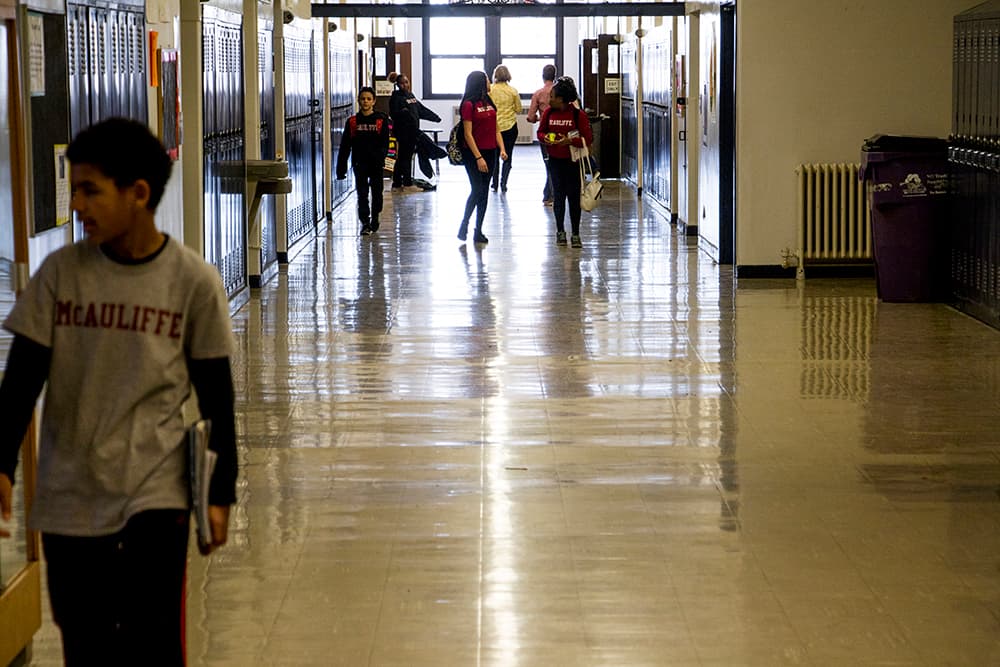The Denver school board postponed a much anticipated announcement this week: Who will be the finalists for the superintendent job?
This was not the first time the naming of finalists was delayed. The board previously pushed back the date from Oct. 15 to Nov. 26 in response to community concerns that the search not be rushed. Board members said they wanted more time to hear all voices.
This time, the board didn't give a reason for the delay, opting instead for a one-sentence press release. The board said it now expects to make an announcement Friday.
Denver Public Schools had been planning to hire a new superintendent by Dec. 10, but the delay pushes that date back. State law requires 14 days between when a finalist or finalists are announced and when the board makes a hire. An interim superintendent, Ron Cabrera, has been in place since former superintendent Tom Boasberg stepped down in late October.
So what happens next? Here are some possible scenarios:
1. The school board names multiple finalists on Friday.
Board member Lisa Flores said earlier this month that the board had taken a close look at 14 candidates and interviewed seven: two superintendents, two deputy superintendents, one state superintendent, and two non-traditional candidates.
She did not reveal any names, though Deputy Superintendent Susana Cordova has said she's interested in the job. Former Dallas superintendent Mike Miles, who is now the head of an Aurora charter school and who some speculated had applied, told Chalkbeat Wednesday that he had initial conversations about the job but decided he wasn't interested.
In a Facebook video Monday, community activists who have been critical of the district said they heard that the board had chosen two finalists but that one had dropped out, leaving a sole finalist. Board members declined to confirm if that was true.
The board would likely face criticism and pushback if it announced only one finalist. Parents, teachers, and city residents have repeatedly called for the board to name two or three finalists -- and to allow the community to meet and question them. Flores said there would be opportunities for the community to do that on Dec. 4 and 5.
It's possible the board has been planning all along to name two or three finalists and just needed more time to deliberate. It's also possible that, if the rumors about a finalist dropping out are true, the board could be reconsidering some candidates it had previously dismissed.
Board members met in executive session on Sunday and again on Wednesday afternoon. An executive session is a non-public meeting on limited topics, such as personnel matters or receiving advice from attorneys.
2. The school board names a sole finalist on Friday.
This has always been a possibility. Even though the community has asked for multiple finalists, the board has been careful to leave open the possibility that it would name just one. For instance, the district's one-sentence press release refers to "superintendent finalist(s)."
It's not uncommon for school districts to name sole finalists. The neighboring Cherry Creek School District did that earlier this year, and Jeffco Public Schools did it in 2017.
A district might not publicize multiple finalists' names for several reasons. For one, candidates might not want the fact that they're looking for a new job -- or that they were a finalist for a job but didn't get it -- to be made public, especially in their current district.
3. The school board announces it will reopen the superintendent search.
This possibility would be a costly one, in terms of time, money, and trust. From the beginning, students, parents, teachers, and city residents have questioned whether the search timeline was too short and have asked the board to extend it, even up to a year.
Reopening the search would essentially do that, and it would likely be welcomed by those who think the district should take its time. But doing so might also elicit questions about how the board has handled one of its most important jobs.
It's also unclear if it would result in a different outcome. Despite concerns that the board wouldn't be able to conduct a thorough search in three months, board member Flores described what sounded like a robust process. She said the board reached out to 95 people and that 27 others expressed interest on their own, resulting in a pool of 122 potential candidates.
Forty-one people ended up applying for the position, she said. That group was whittled down to the 14 candidates who got a close look and the seven who got interviews, Flores said.
The board had some help from an executive search firm called Hazard, Young, Attea and Associates. The district agreed to pay the firm up to $30,000 plus travel and advertising expenses to help recruit candidates, develop interview protocols, and help the board deliberate.
The board also hired a local political consulting firm called Dimension Strategies to facilitate community meetings to gather feedback on the characteristics and qualifications the next superintendent should have. The district agreed to pay up to $80,300 to Dimension Strategies.
One more complicating factor: Three of the seven board seats are up for election in November 2019. The board currently includes two members who were backed by the teachers union -- which opposes strategies such as closing struggling schools, and wants to halt charter school expansion -- and five members who were not. If union-backed candidates win at least two of the open seats, the balance of power on the board could shift.
The longer the superintendent search continues, the more likely it becomes that political factors could influence the outcome, whether that's current board members responding to certain pressures or potential candidates staying away because they don't know if the board that hires them will stay in power. The board had hoped the new superintendent would start in January.
Chalkbeat is a nonprofit news site covering educational change in public schools.













